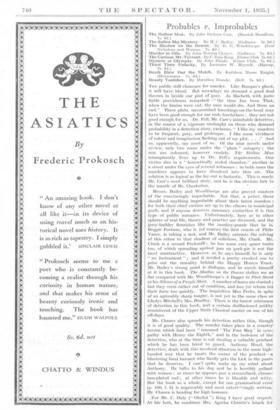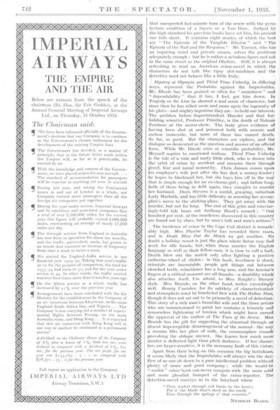Probables v. Improbables
' 7s. 6d.)
Death Blew Out the Match. By Kathleen Moore Knight: (Heinemann. 7s. 6d.) Beauty Vanishes. . By Dorothea Braude. (Boll.. 7s. 6d.) • TILE public still clamours for murder. Like Banquo's ghost, it willhave blood. But nowadays we demand a good deal thrown in beside our pint of gore. As Macbeth with justi-' liable peevishness remarked—" the time has been That, when the brains were out, the man would die, And there an end." These plain, unvarnished knockings-on-the-head may have been good enough for our rude forefathers ; they are not
good enough for us. Dr. Fell, Mr. Carr's inimitable detective, in the course of a. vigorous onslaught on those who demand probability in a detection story, exclaims, " I like my murders to be frequent, gory, And grotesque. I like some vividness of colour and imagination flashing out of my plot. . . ." And.
so, apparently, say most of us. Of the nine novels under review, only two come under the " plain " category ; the rest are coloured, however crudely. The Hollow Man,
triumphantly lives up to Dr.. Fell's requirements. One victim dies in a " hermetically sealed chamber," another in a street under the eyes of several witnesses : in both cases the
murderer appears to have dissolved into thin air. The solution is as logical as the lay-out is fantastic. This is surely Mr. Carr's most brilliant story, and he is the obvious heir to the mantle of Mr. Chesterton.
Messrs. Bailey and Woodthorpe are also proved masters of the convincingly improbable. Not that, a priori, there should be anything improbable about their latest murders : for both their chief victims are up to the elbows in municipal graft, and if anyone deserves summary extinction it is this type of. public nuisance. Unfortunately, here as in other spheres of real life, theory and practice are divorced, and the jerry-builder flourishes like the monkey-puzzle that he Reggie Fortune, who is (of course) the first cousin of Philo
Vance, is taking a rest, and Mr. Bailey entrusts the solving of this crime to that shadiest of solicitors, .Mr. Clunk, Mr.
Clunk is a second Pecksniff : he has some very queer traits too, of which spreading apricot jam on pork-pie is not the most unattractive. However, as he says himself, he is only " an Instrument " ; and it needed a pretty crooked one to prise out the rascality behind the Happy Homes Trust. Mr. Bailey's strong point is dialogue, and he excels himself
at it in this book. The Shadow on the Downs strikes me as flat compared with Mr. Woodthorpe's A Dagger in Fleet Street
or his Silence of a Purple Shirt. A number of hares'are started ; but they seem rather out of condition, and lose (or return to)
their form too quickly. The inquisitive Miss Perks, in spite of an agreeably sharp tongue, is not yet in the same class as Gladys Mitchell's Mrs. Bradley. There is the barest minimum of detection in this book, and a certain disillusioned aridity reminiscent of the Upper Sixth Classical master on one of his off-days.
Mr. Chance also spreads his detection rather thin, though it is of good quality. The murder takes place in a country tavern which had been " renamed ' The Free Man ' in sym- pathy with Henry the Eighth," and in the bedrOom of the detective, who at the time is out stealing a valuable pendant which he has been hired to guard. Anthony Hood, the detective, deals with this involved situation in the same high-1 handed way that he treats the owner of the pendant—a blustering local baronet who finally gets the kick in the pants that he deserves. I can't quite make up my mind about Anthony. He talks to his dog and he is horribly gallant, with women : at times he appears just a streamlined, chrom- ium-plated cad ; at other times he is likeable and witty., But the book as a whole, except for one grammatical error, (p. DO, 1. 3). is impeccably and most entertniningly written.' Mr. Chance is heading for high honours. , For Mr. C. Daly (" Obelist ") King I have great respectj At his best,' he combines Mrs. Agatha Christie's knack for
that unexpected last-minute turn of the screw with the pyror technic erudition of a Sayers or a Van Dine. Judged by the high standard his previous books have set him, his present
one falls short. It contains eight heist
stories,' of which the Iv
are " The Episode of the Tangible IllusiOn " and " The Episode of the Nail and the Requiem."• Mr. Tarrant, who has an inquiring mind and private means, solves the problems adequately enough : but he is rather a nebulous figure and not M the same street as the original Obelists. Still, it is always refreshing to read an American crime-novel in which the characters do not talk like tipsy slot-machines and the detective need not behave like a little Italy.
Mystery at Olympia and Third Time• Unlucky,.ia.diff ering ways, represent the Probables against the Improbable's. Mr. Rhode has been praised so often for " soundness " and " dependability " that it has, • I feel, got him down. In Tragedy on the Line he showed a real sense of character, Mit since then he has relied more. and more upon the ingenuity of his plots—and mighty ingenious they are—to'hold our interest. The problem before Superintendent Hanslet and that for.; bidding scientist, Professor Priestley; is the death of Nahum Pershore at the motor-show. The body gives evidence of having been shot at and poisoned both with arsenic and carbon monoxide, but none of these has caused death. So far, so good. But the characters are ciphers, and the, dialogue as desiccated as the question and answer of an official form. While Mr. Rhode aims at scientific probability, Mr. Meynell aspires to emotional realism. Third Time Unlucky is the tale of a vain and nasty little clerk, who is drawn into the orbit of crime by accident and remains there through greed; fear and moral nonentity. Chris Jansen comes upon his employer's wife just after she has shot a money-lender : he hopes to blackmail her, but she buys him off in the way that is simple enough for an ex-chorus-girl ; and before long, both of them being in debt again, they conspire to murder her husband. Doris Stevens is a sordid, grasping, suburban Lady Macbeth, and haslittle difficulty in screwing her aeconal plices nerve to the sticking-place. They get away with thei murder, but not for long. The end of this grimand convinces singly-told tale bears out Anthony Hood's remark : " One hundred per cent. of the murderers discovered in this country are found not by clues, but by men's talk and men's actions.".
The incidence of crime in the Cape Cod district is remark-,
ably high. Miss Phoebe Taylor has recorded three cases, and in Death Blew Out the Match we get another. No doubt a holiday resort is just the place where Satan may find, work for idle hands, but, when these murder the English' language as well as their fellow-men, it is time to call a halt., Death blew out the match only after lighting a positive, Catherine-wheel of cliches : in this book, loveliness is sheer, drientals are inscrutable, people grit things out between. clenched teeth, coincidence has a long arm, and the heroine& fingers at a critical moment are all thumbs—a disability whicli also attaches itself, I'm afraid, to Miss Knight's literary style. Miss Brande, on the other hand, writes exceedingly virell. Beauty Vanishes, for its subtlety of characterisation and atmosphere must be bracketed first with The Hollow Man; though it does not set out to be primarily a novel of detection. This story of a rich man's beautiful wife and the three artists vibe are commissioned to paint her contains a leisurely and remorseless tightening of tension which might have earned, the approval of the author of The Turn of the Screw. Miss Brande has the gift for suggesting the abnorrnal through an almost imperceptible disarrangement.of the normal—the way a: woman lifts her glass of milk, the commonplace remark Provoking the oblique answer. She knows how much more sinister is deflected light than. pitch darkness. If her charac- ters are hyper-sensitive, it is the necessary fault of this virtue.
I Apart from their being on this occasion the big battalions, it seems likely that the Improbables' will always win the day. Few of us can sit down to a pure intellectual problem without plenty of sauce and good company : while the would-be " realist" crime book can never compete with the more solid and more ghoulish banquet of the crime-reporter. The detection-novel conveys us to the fairyland where
"They waded through rod blade to the knee ; For a' the blude that's shed on the earth fins through the springs o' that countrie."
NICIIOLAS BLAKE.



























































 Previous page
Previous page